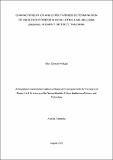| dc.description.abstract | The soil samples from fifteen villages which grow Lablab in Babati district were collected and
used for planting Lablab in experimental pot to trap indigenous rhizobia. At a flowering stage,
the plants were harvested and root nodules were collected for rhizobia isolation using Yeast
Extract Mannitol Agar (YEMA). Under aseptic conditions, twenty-two isolates were obtained
and characterized by morphological, biochemical and physiological characteristics.
Furthermore, PCR amplification of 16S rDNA and symbiotic effectiveness were also
evaluated. The results showed that, rhizobia were fast and slow growing in YEMA after 4 - 7
days of incubation. In YEMA with Congo red one isolates absorbed the color, while,
physiologically all isolates were alkaline tolerant, however susceptible to acidity and sodium
chloride above 3%. High diversity among isolates was observed in dendrogram at 70%
similarity level by forming two groups with seven clusters. Only 18 isolates out of 22 were
amplified. In testing symbiotic effectiveness, all 22 isolates induced nodules in Lablab,
interestingly some were effective than commercial inoculants. Most of isolates recorded
relative symbiotic effectiveness above 100, the highest was 193 for BR4. Isolates BR4, BR13,
BR16, BR5 and BR18 were effective than other isolates and commercial strains. The results
implied presence of diverse and effective indigenous rhizobia nodulating Lablab in Tanzania,
also highlights their potential to be used for inoculating Lablab instead of commercial
inoculants. To recommend characterization by sequencing to identify their genetic groups and
field effectiveness evaluation is needed in order to identify more effective isolates for
inoculants production. | en_US |

